A person sentenced to prison in the U.S. serves an average sentence of three years. That's more than 3,000 meals they'll be served behind bars, which could be considered part of the punishment.
According to a recent report from the advocacy group, Impact Justice, prison meals are typically overly processed — high in sodium, sugar, saturated fat and cholesterol — and low in fresh fruits, vegetables and quality protein.
Some are also downright unpalatable. Picture mystery meat doused with dull gravy and food that is underdone, overcooked or just plain rotten. The food has implications for physical and emotional wellbeingas well as health care costs down the road.
For Russell Rollins, the worst meals he has eaten during his incarceration were in county jail.

"Usually, the lettuce that they give you, it's all brown and it's slimy and it definitely does a number on the guts," he says.
Julio Orsini says he has often gone to bed hungry because he couldn't stomach what was being offered in the chow hall line. While serving time in one county jail, Orsini says, he worked in the kitchen, where he handled boxes of food labeled "Not For Human Consumption."
"So, like the oatmeal, the ham … It leaves us questioning to ourselves, like, what are they feeding us?" Orsini says.
Leslie Soble of the Prison Food Project at Impact Justice says stories like these are not unusual.

"It's really hard to provide a good quality and nourishing meal for about $3 per person per day, which is about the average in this country. It's much less in some facilities," Soble says.
And there's a general lack of accountability and oversight around food preparation in correctional settings, Soble says. It's not like a restaurant where the health department makes an unannounced inspection and can shut the place down if there are serious violations. In prisons and jails that's not an option. Instead, residents may rely on the commissary to purchase ramen and other easy-to-heat items to get enough to eat.
"There's this sentiment that individuals who have caused harm are not deserving of quality food. They're not deserving of wellness and care," Soble says. "They're not disposable, but that's the message that we're sending them through food."
Maine Corrections Commissioner Randall Liberty wants to change that perception. When he was growing up, his father was repeatedly incarcerated, which left the family food insecure. Some of the best meals he remembers were in the school cafeteria, and that has made him sensitive to the need for nutritious meals.

"I know nationally that this is an area for improvement for my industry," he says. "Obviously, there's a budget issue. It costs a lot to feed a lot of people."
But Liberty says the key is collaboration with local farmers. As adults, Liberty and his brothers worked with a farm that donated food to soup kitchens and pantries. Now he's a master gardener and beekeeper who has paved the way for more than 100 residents of the Maine State Prison to be trained or certified as either.
"We have residents that want to get their fingers in the dirt and want to grow things and then produce their own food," he says. "It's very rewarding and it normalizes the prison experience when you go to the Maine State Prison, or you go to Mountain View … and you see gardens there, and the gardens are lush."
In a recent report on prison food, Impact Justice highlighted Mountain View's approach as an exception to the standard prison fare. With just under 400 residents, the small and rural facility regularly incorporates locally sourced products into its meals, and its two-and-a-half-acre garden can produce more than 100,000 pounds of vegetables each year.

Head cook Tim Rooney is serving time at Mountain View, but says he likes working in the kitchen, where he can experiment with recipes using organically grown vegetables that are raised by prison residents across the road.
"Tonight, we're doing a spinach and kale salad with chicken cacciatore over rice," he says. "Over the last year I've learned a lot about making different meals, making like a balanced meal."
Growing in the garden are 20 varieties of onions and lettuces, dark green and red peppers alongside tomatoes, cabbages, Asian greens and bok choy. Orsini says until he was incarcerated at Mountain View, he hadn't tasted fresh produce in more than a year. Now he gets paid a little bit of money to tend to the vegetables, which regularly show up on his lunch and dinner tray.
"I love it, actually," he says. "I mean I love just watching all the stuff grow. You know, all hard work you put into the field, all the harvest you get."

Mark McBrine is convinced these efforts can be expanded and replicated. An organic farmer by trade, McBrine is the agriculture program director at Mountain View and the food service manager who started a bakery at the prison. For the past six years, residents have baked all their own bread and rolls.
"We've saved a lot of money. The first year we were $142,000 under budget. And not only did we save money, but we were able to produce better quality meals," he says.
Now, corrections officials say there's just one thing they need: a processor to extend the life of vegetables beyond the growing season so that residents can have fresh food all year.



